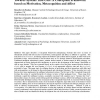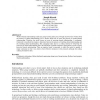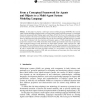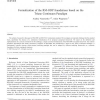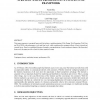168
click to vote
AIEDU
2010
14 years 9 months ago
2010
: This paper describes a Conceptual Framework underpinning "Systems that Care" in terms of educational systems that take account of motivation, metacognition and affect, ...
137
click to vote
ETS
2002
IEEE
15 years 1 months ago
2002
IEEE
Without shared understanding, hardly any group learning takes place. Though much has been written about the essence of shared understanding, less is known about how to assess the ...
124
click to vote
AAMAS
2004
Springer
15 years 1 months ago
2004
Springer
In this paper we propose a multi-agent system modeling language (MAS-ML) that extends UML (Unified Modeling Language) based on structural and dynamic properties presented in a conc...
128
click to vote
JKM
2007
15 years 1 months ago
2007
Purpose – The purpose of this article is to explore the potential of visualization for corporate knowledge management. Design/methodology/approach – The employed methodology c...
130
click to vote
CSI
2007
15 years 2 months ago
2007
The subject of research in this paper is RM-ODP, an ISO/ITU-T international standard. We investigate an important challenge that the standard faces, specifically the absence of a ...
135
click to vote
JIKM
2008
15 years 2 months ago
2008
Businesses today, including non-profits, recognise the need for knowledge management (KM). KM may require new strategies and goals before it can be implemented, or it can be aligne...
130
click to vote
COMPUTER
2006
15 years 2 months ago
2006
The role of intuition in software development was discussed in a most original fashion by Peter Naur in 1984. Yet there has been little subsequent interest in elaborating on Naur&#...
110
click to vote
IADIS
2003
15 years 3 months ago
2003
This paper proposes a conceptual framework that relates e-marketing strategy (Web-Design, Web-Promotion, Web-Price and Web-CRM) with performance at web and firm levels, while cons...
108
click to vote
CRIWG
2003
15 years 3 months ago
2003
This article presents a conceptual framework for the identification and classification of contextual elements included in groupware applications. Contextual elements store informat...
131
click to vote
TAMODIA
2008
15 years 3 months ago
2008
In this paper we introduce MuiCSer, a conceptual process framework for Multi-disciplinary User-centred Software Engineering (UCSE) processes. UCSE processes strive for the combinat...
